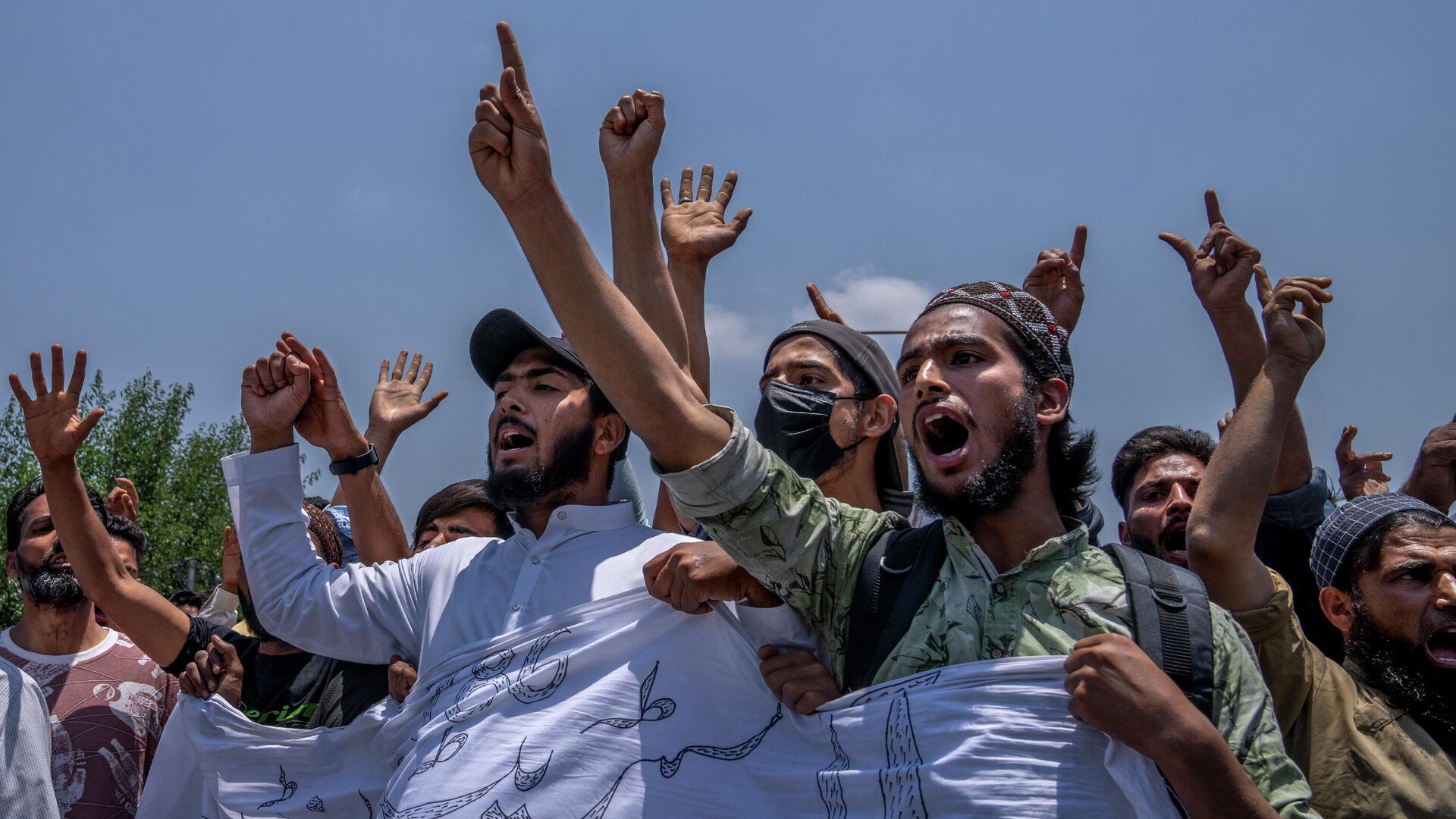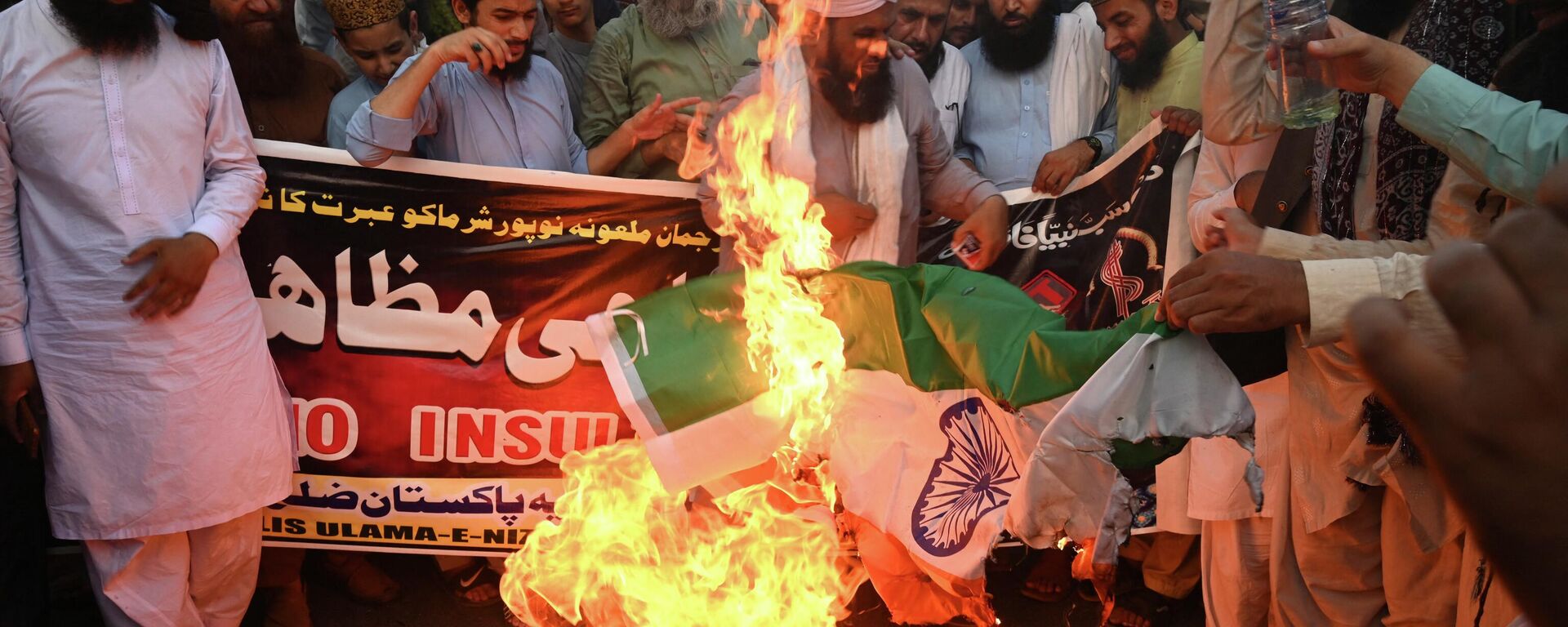https://sputnikglobe.com/20220615/pakistan-thanks-iran-for-steadfast-support-on-kashmir-issue-criticises-india-for-islamophobia-1096322973.html
Pakistan Thanks Iran for 'Steadfast Support' on Kashmir Issue, Criticises India for ‘Islamophobia’
Pakistan Thanks Iran for 'Steadfast Support' on Kashmir Issue, Criticises India for ‘Islamophobia’
Sputnik International
Both Pakistan and Iran separately summoned the Indian Ambassadors this month to protest ex-BJP spokeswoman Nupur Sharma’s controversial remarks about the... 15.06.2022, Sputnik International
2022-06-15T08:46+0000
2022-06-15T08:46+0000
2022-12-08T18:02+0000
iran
hossein amir abdollahian
islamophobia
bharatiya janata party (bjp)
kashmir
pakistan
https://cdn1.img.sputnikglobe.com/img/07e6/06/0f/1096327816_0:0:3073:1728_1920x0_80_0_0_050fb8f67ccd0ebc5543b276700eb09d.jpg
Pakistan Foreign Minister Bilawal Bhutto Zardari has expressed Islamabad’s gratitude to the Iranian leadership for its “steadfast support for the just cause of Kashmiri people”. Zardari came as he met Iranian President Dr. Seyyed Ebrahim Raisi and Foreign Minister Hossein Amir-Abdollahian in Tehran on Tuesday.Addressing a joint press conference with Amir-Abdollahian, Zardari said that the “focus” of their talks in the context of “regional security” situation was on the question of Jammu and Kashmir, a predominantly Muslim region claimed by both New Delhi and Islamabad.Successive Pakistani governments have been critical of New Delhi’s decision to scrap the semi-autonomous status of Jammu and Kashmir in August 2019. Islamabad downgraded its diplomatic and commercial ties with New Delhi over the move, and has refused to hold bilateral talks with India till Prime Minister Narendra Modi’s government rolls back the revocation of the erstwhile state's special status. The erstwhile state now exists as the federal government-administered Jammu and Kashmir Union Territory of India.Pakistan says that India wants to "alter the demography" of Jammu and Kashmir by bringing in Hindu settlers from other parts of the country.Time and again, New Delhi has rejected these concerns and maintained that its decisions in Jammu and Kashmir, including the move to change the region's semi-autonomous status, remain an “internal matter” of India. India has also said that the overall question of Kashmir is a “bilateral matter” between New Delhi and Islamabad and that it would brook no “interference” from a third party on resolving the decades-old territorial dispute.Iran, which enjoys rather warm and longstanding ties with India, has also previously asked India to restore Jammu and Kashmir’s semi-autonomous status.“We have good relations with India, but we expect the Indian government to adopt a just policy towards the noble people of Kashmir and prevent the oppression and bullying of Muslims in this region,” Iran’s Supreme Leader Ali Hosseini Khamenei said it in August 2019."Some do not like the good relations between the two Muslim, neighbouring, friendly and brotherly nations, but the development of relations leads to economic prosperity and more security for the nations of the region,” the Iranian leader also remarked at the meeting. Pakistan Criticises ‘Islamophobia’ in IndiaZardari also said that the international row created by the controversial remarks of suspended Bharatiya Janata Party (BJP) spokesperson Nupur Sharma on the Prophet Muhammad also figured in discussions with the Iranian leadership. New Delhi has clarified that Sharma's remarks "do not reflect the views of the (Indian Government)”.“He said we have agreed that it is time for the international community to show common resolve against Islamophobia, Xenophobia and intolerance and incitement to violence on the basis of religion or belief,” it added.Another statement from Pakistani government also said that Zardari held a telephonic conversation with the United Nations (UN) Antonio Guterres on the “derogatory remarks” by Sharma.The Pakistani government has been critical of the Indian government’s reaction to protests triggered by Sharma’s remarks.“India has unleashed its brutal and oppressive state apparatus to browbeat Indian Muslims into submission. The whole plan is to further marginalise them politically, economically and culturally. The reality of India's democratic face is before the world to see,” Pakistani Prime Minister Shehbaz Sharif said on Monday (13 June).Around 600 Indian protesters, mostly Muslims, have been arrested in the wake of violent protests which rocked multiple Indian states after Friday prayers last week. Muslim groups in India have demanded the arrest of Sharma, who is currently under investigation for her remarks.
https://sputnikglobe.com/20220610/era-of-impunity-is-over-why-is-india-facing-the-heat-of-islamic-nations-1096180755.html
iran
kashmir
pakistan
Sputnik International
feedback@sputniknews.com
+74956456601
MIA „Rossiya Segodnya“
2022
News
en_EN
Sputnik International
feedback@sputniknews.com
+74956456601
MIA „Rossiya Segodnya“
Sputnik International
feedback@sputniknews.com
+74956456601
MIA „Rossiya Segodnya“
iran, hossein amir abdollahian, islamophobia, bharatiya janata party (bjp), kashmir, pakistan
iran, hossein amir abdollahian, islamophobia, bharatiya janata party (bjp), kashmir, pakistan
Pakistan Thanks Iran for 'Steadfast Support' on Kashmir Issue, Criticises India for ‘Islamophobia’
08:46 GMT 15.06.2022 (Updated: 18:02 GMT 08.12.2022) Both Pakistan and Iran separately summoned the Indian Ambassadors this month to protest ex-BJP spokeswoman Nupur Sharma’s controversial remarks about the Prophet Muhammad during a TV debate last month. During his visit to New Delhi last week, the Iranian Foreign Minister asked the Indian government to respect the “sensitivities” of Muslims.
Pakistan Foreign Minister Bilawal Bhutto Zardari has expressed Islamabad’s gratitude to the Iranian leadership for its “steadfast support for the just cause of Kashmiri people”.
Zardari came as he met Iranian President Dr. Seyyed Ebrahim Raisi and Foreign Minister Hossein Amir-Abdollahian in Tehran on Tuesday.
An official release by Pakistan’s Ministry of Foreign Affairs (MoFA) said that Zardari briefed the Iranian side on the “serious human rights situation” in the erstwhile Indian state of Jammu and Kashmir.
Addressing a joint press conference with Amir-Abdollahian, Zardari said that the “focus” of their talks in the context of “regional security” situation was on the question of Jammu and Kashmir, a predominantly Muslim region claimed by both New Delhi and Islamabad.
Successive Pakistani governments have been critical of New Delhi’s decision to scrap the semi-autonomous status of
Jammu and Kashmir in August 2019.
Islamabad downgraded its diplomatic and commercial ties with New Delhi over the move, and has refused to hold bilateral talks with India till Prime Minister Narendra Modi’s government rolls back the revocation of the erstwhile state's special status.
The erstwhile state now exists as the federal government-administered Jammu and Kashmir Union Territory of India.
Pakistan says that India wants to "alter the demography" of Jammu and Kashmir by bringing in Hindu settlers from other parts of the country.
Time and again, New Delhi has rejected these concerns and maintained that its decisions in Jammu and Kashmir, including the move to change the region's semi-autonomous status, remain an “internal matter” of India.
India has also said that the overall question of Kashmir is a “bilateral matter” between New Delhi and Islamabad and that it would brook no “interference” from a third party on resolving the decades-old territorial dispute.
Iran, which enjoys rather warm and longstanding ties with India, has also previously asked India to restore Jammu and Kashmir’s semi-autonomous status.
“We have good relations with India, but we expect the Indian government to adopt a just policy towards the noble people of Kashmir and prevent the oppression and bullying of Muslims in this region,” Iran’s Supreme Leader Ali Hosseini Khamenei said it in August 2019.
As per an official release put out by Tehran after Raesi's meeting with Zardari, the Iranian President said "we consider Pakistan's security to be our own security".
"Some do not like the good relations between the two Muslim, neighbouring, friendly and brotherly nations, but the development of relations leads to economic prosperity and more security for the nations of the region,” the Iranian leader also remarked at the meeting.
Raisi also said there are “no restrictions” on developing comprehensive ties between the two countries, as he underlined that Tehran could help Islamabad meet its demand for oil, gas and electricity.
Pakistan Criticises ‘Islamophobia’ in India
Zardari also said that the
international row created by the controversial remarks of suspended Bharatiya Janata Party (BJP) spokesperson Nupur Sharma on the Prophet Muhammad also figured in discussions with the Iranian leadership.
New Delhi has clarified that Sharma's remarks "do not reflect the views of the (Indian Government)”.
“The Foreign Minister said he also discussed the rising tide of Islamophobia and the recent derogatory remarks made by officials in India that deeply offended Muslims across the world,” a statement from the Pakistani Foreign Ministry stated.
“He said we have agreed that it is time for the international community to show common resolve against Islamophobia, Xenophobia and intolerance and incitement to violence on the basis of religion or belief,” it added.
Another statement from Pakistani government also said that Zardari held a telephonic conversation with the United Nations (UN) Antonio Guterres on the “derogatory remarks” by Sharma.
“The Foreign Minister apprised the Secretary General of the ongoing Islamophobic actions by India’s ruling party, BJP, in particular the derogatory remarks recently made by two of its senior officials towards the Holy Prophet Muhammad,” it said.
The Pakistani government has been critical of the Indian
government’s reaction to protests triggered by Sharma’s remarks.
“India has unleashed its brutal and oppressive state apparatus to browbeat Indian Muslims into submission. The whole plan is to further marginalise them politically, economically and culturally. The reality of India's democratic face is before the world to see,” Pakistani Prime Minister Shehbaz Sharif said on Monday (13 June).
Around 600 Indian protesters, mostly Muslims, have been arrested in the wake of violent protests which rocked multiple Indian states after Friday prayers last week.
Muslim groups in India have demanded the arrest of Sharma, who is currently under investigation for her remarks.


